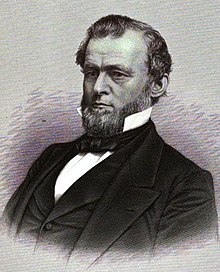Trenor W. Park | |
|---|---|
 From 1893's American Encyclopaedia of Biography | |
| Member of the Republican National Committee from Vermont | |
| In office 1868–1870 | |
| Preceded by | Abraham B. Gardner |
| Succeeded by | Luke P. Poland |
| Member of the Vermont House of Representatives from Bennington | |
| In office 1865–1869 | |
| Preceded by | Abraham B. Gardner |
| Succeeded by | Luther R. Graves |
| Chair of the California Republican State Central Committee | |
| In office 1856–1860 | |
| Preceded by | New position |
| Succeeded by | William Sherman |
| Personal details | |
| Born | December 8, 1823 Woodford, Vermont |
| Died | December 13, 1882 (aged 59) Aboard ship San Blas between New York City and Aspinwall, Panama |
| Resting place | Old Bennington Cemetery, Bennington, Vermont |
| Political party | Whig (Before 1856) Republican (From 1856) |
| Spouse | Laura Van Der Spiegle Hall (m. 1846–1875, her death) |
| Children | 3 |
| Relatives | Hiland Hall (father in law) John G. McCullough (son in law) Julia Hunt Catlin (daughter in law) |
| Occupation | Attorney Businessman Politician |
| Signature | |

Trenor William Park (December 8, 1823 – December 13, 1882) was an American lawyer, political figure, and businessman. He was most notable as a founder of the Republican Party in California, and for his Republican leadership roles in Vermont, including member of the Republican National Committee and the Vermont House of Representatives.
Born in Woodford, Vermont, Park studied law as a teenager, and attained admission to the bar at age 21, as soon as he was legally eligible. He practiced in Bennington until 1852. Park was also a businessman, and invested in lumbering and other ventures. In 1846 he married Laura Van Der Spiegle Hall, whose father Hiland Hall had served as a Congressman and Governor of Vermont. In 1851, Hall was named Chairman of the U.S. Land Commission that settled Mexican land titles after the annexation of California. He relocated to San Francisco, and Park went with him.
In California, Park practiced law and was a founder of the Halleck, Peachy, Billings & Park firm. He continued to pursue business opportunities, including real estate and mining, and became the manager of John C. Frémont's Rancho Las Mariposas gold mine. Park faced temporary financial setbacks during the Panic of 1857, but recovered and became very wealthy. When the Republican Party was organized in the mid-1850s, Park won election as the first Chairman of the state party's Central Committee.
Park returned to Vermont in 1864, and continued to practice law and pursue investments in a variety of businesses while also maintaining a residence in New York City. He also served as a member of the Vermont House of Representatives and Vermont's member of the Republican National Committee. Park was a candidate for the 1874 Republican nomination for Governor but withdrew in favor of Asahel Peck, who went on to win the general election.
A noted civic activist and philanthropist, Park's donations included Bennington's public library, the building and land for the Vermont Soldiers' Home, and the University of Vermont's Park Gallery of Art, which later became part of the university's Robert Hull Fleming Museum. Park died at sea in 1882, and was buried first at Brooklyn, New York's Green-Wood Cemetery, and later at Bennington's Old Cemetery.
